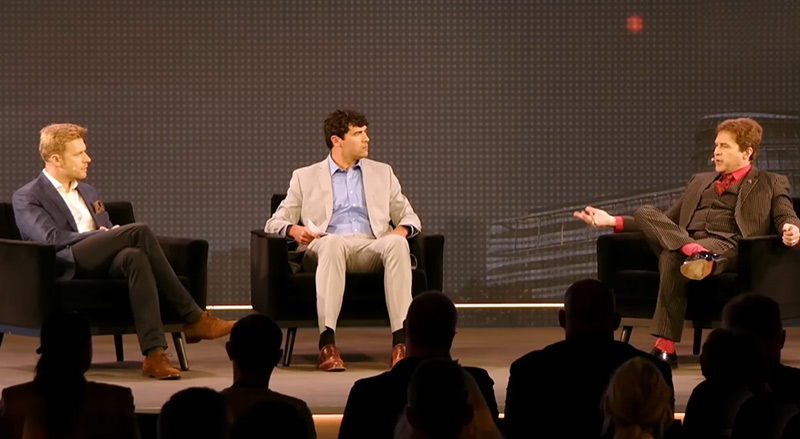In a fireside chat at the recent London Blockchain Conference, Marcin Zarakowski, (Executive Committee Member at BSV Blockchain), Connor Murray (Stewardship Lead at BSV Blockchain, and Dr Craig S. Wright discussed how Bitcoin is a unilateral contract, what that means, and the specific obligations of certain parties within the ecosystem under the terms of that contract.
Dealing with legal challenges of early crypto-assets before Bitcoin
The discussion started by focusing on the beginnings of crypto-assets and digital cash solutions, of which Bitcoin was far from the first, as Dr Wright explains. While Wright was studying IT and Computer Science, he realised that these attempts failed due to legal challenges:
‘I’ve been involved in what was the digital cash and cryptocurrency industry in the 90s and the very different areas. Now, as I was studying, I read many of the aspects of problems that have been occurring in the industry. I mean, that is all being closed down because of ignoring the legal sort of constraints. So then I started thinking I needed to understand this a lot more,’ he said.
Recognising the legal challenges in the industry, he pursued postgraduate studies in International Trade and Finance Law, specialising in Electronic Contract Law. His focus included areas like bills of exchange, global shipping, and electronic documentation. Wright also mentions that he underwent training with Benjamin Wright, a computer science/legal scholar in the US, to understand the necessity of maintaining contracts and proving electronic transactions.
This multidisciplinary background, combining computer science and law, contributed to Wright’s insights into the legal aspects of digital cash and crypto-assets.
The Unilateral Contract of Bitcoin
When asked about the Unilateral Contract of Bitcoin, Wright defines it as an offer made to the world. In this offer, mining nodes act as agents of the network, which includes e.g. verifying transactions and distributing coins. The contract allows individuals, as parties to the contract, to come and go as they please. However, the discussion highlights that certain terms and conditions do apply when using Bitcoin.
In this context, Dr Craig Wright points out that white papers, in the financial industry, serve as legally binding documents:
‘So a white paper is a financial document. Many people don’t understand that it’s legally binding. So when you put something like that before a financial product, you’re bound by it. The comments the creator makes are also binding. So when I say that the system is set in stone, that’s a legally binding term that allows people to rely on those statements.’
Wright emphasises that the contracts in the Bitcoin network are diverse, addressing different aspects and stakeholders. He explains that various parties participate in different contracts. Users holding digital tokens are for example one party. The user’s contract involves the promise of a certain number of tokens, specifically 21 million Bitcoins, and the stability of the protocol. Other important parties are nodes and the BSV Association.
The role of nodes and the BSV Association in the Unilateral Contract
Connor Murray and Marcin Zarakowski inquire about the historical role of Bitcoin nodes and their engagement in the contract. Dr Craig Wright clarifies that the systems often mistaken for nodes, such as Raspberry Pis, are sybils and not actual nodes as defined in the white paper. He emphasises that true nodes are paid to validate, order, and distribute blocks, and they are bound by contract law to act honestly.
Wright further explains that the counterparty for such nodes is the issuer of the coins. He mentions that this was the original intention behind the Bitcoin Foundation, which was meant to act as a steward for the protocol. Wright acknowledges that the BSV Association (BA) currently acts in a similar role.
In this context, Wright outlines the Association’s responsibility for stability, scaling, and preserving the protocol. He states that the main obligation is to ensure that applications built today will continue to work in the future. While cryptographic algorithms and protocols may be broken over time, the BSV Association’s role is to make sure that applications built on BSV will remain functional for years to come. The goal is to allow people to connect to the internet or the BSV network even with older software versions, highlighting the importance of long-term reliability.
The role of the creator
In the course of the discussion, Wright also defends the rights of the creator, highlighting that as open-source developers, they have the right to determine how the system they create will be run. He references the role of Linus Torvalds in the Linux kernel development as an example of this.
Throughout the discussion, Craig Wright also refers to his own life and recounts difficult times and problems that ultimately prevented and delayed the development of the BSV ecosystem. He mentions that he did not expect that people would modify the protocol and remove or replace certain opcodes and features of Bitcoin permanently:
‘When I said: “Don’t change it.” I expected people wouldn’t. I thought when people went away going: “We can fix these opcodes”. – “I’ll let you turn them off for the moment and we’ll fix them later.” I thought people actually would. So I expected a very different outcome at the beginning. But I’ve come to understand that without active leadership, people go off in all directions.’
